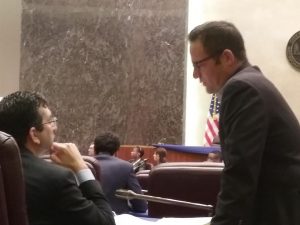Chicago expands building inspection program
By Kevin Beese Staff reporter — October 30, 2017
Chicago aldermen Scott Waguespack (32nd Ward, seated) and Joe Moreno (1st Ward) discuss an issue during a City Council budget hearing last week on the city’s Building Department. Aldermen heard during the hearing about the department’s success in addressing troubled buildings. (Photo by Kevin Beese/Chronicle Media)
Chicago is slated to begin weeknight and Saturday construction inspections in December.
Long a request of city aldermen, the off-hour inspections will be done at no additional cost to the municipality as employee volunteers are being sought for the shift change, according to Judy Frydland, commissioner of the city’s Building Department.
“We are going to offer them alternative shifts, such as 10 a.m. to 6:30 p.m.,” Frydland said at a City Council budget hearing last week. “We are not paying overtime.”
Ald. Patricia Dowell (3rd Ward) said the move is a necessary one for the city.
“We need inspectors nights and weekends,” Dowell said.
The city’s inability to check construction projects on weekends and after normal business hours has been a complaint of aldermen for years.
The expansion of the inspection program is just one of the many positives coming out of the city’s Building Department.
Frydland said construction is booming in the city, noting that 1,000 more construction permits have been issued this year than last year. She said by year’s end the city will likely have issued 4,500 construction permits than it did in 2015.
She noted that the city has been able to streamline the process of getting trouble building addressed in court. Frydland said having aldermen appear for troubled building cases makes a difference with the judges.
“It is so important that aldermen come to court,” the Building Department commissioner said. “The judge sees that we are not just running around giving out citations. We have a lot better chance of moving someone else into that property if the alderman is there. If we can get a family in there, how much better is that?”
She said depending on the case the city can now often get a troubled building problem addressed or turned over to new ownership in six to nine months.
Frydland said the city’s forfeiture program for dangerous and hazardous conditions in vacant buildings had been successful with judicial deeds for the land being given to a third party.
“We were doing quite a few,” she said, “but then new judges came on board and they had a lot of questions.”
The program allows the city to file a petition in Cook County Circuit Court based on a building’s dangerous and hazardous conditions that have not been addressed. The city requests that the property be forfeited to an eligible third party. The goal of the forfeiture is the abatement of criminal activity and blight associated with nuisance buildings and the preservation of viable housing stock whenever possible.
She said the newer judges are starting to see the validity of the program.
“We are starting to get more consideration of the program,” Frydland said. “We are seeing use of the procedure. It is up from a few months ago.”
The building commissioner said her department is willing to work with anybody having the wherewithal to fix up a property and is a local resident. She said property owners who live outside the Chicago area are more difficult to work with.
“It is very important that they are local,” Frydland said of property owners.
Ald. Emma Mitts (37th Ward) said it is important for residents to be involved in the process when a troubled property is in court.
“People need to attend each hearing when there is an eyesore, a problem in the community,” Mitts said. “I’ve seen cases tied up for some time in the court system, but it has an impact on the judge when community residents show up. People need to be bold. We need to hold these property owners more accountable rather than letting them go off in the sunset, leaving their property behind.”
Frydland said that programs to get vacant lots and buildings into the hands of community groups and developers have been successful for the city
“With vacant buildings, we have neighborhood groups, community groups and developers taking on purchasing properties for the taxes,” she said.
She said the city continues to find ways around lengthy and costly court proceedings with steps such as working with the Cook County Land Bank to acquire properties and having community groups or developers buy properties directly.
“A coordinated effort helps,” Mitts said.
Free subscription to Cook County Chronicle Digital Edition
Read the digital edition of the Cook County Chronicle
— Chicago expands building inspection program —








